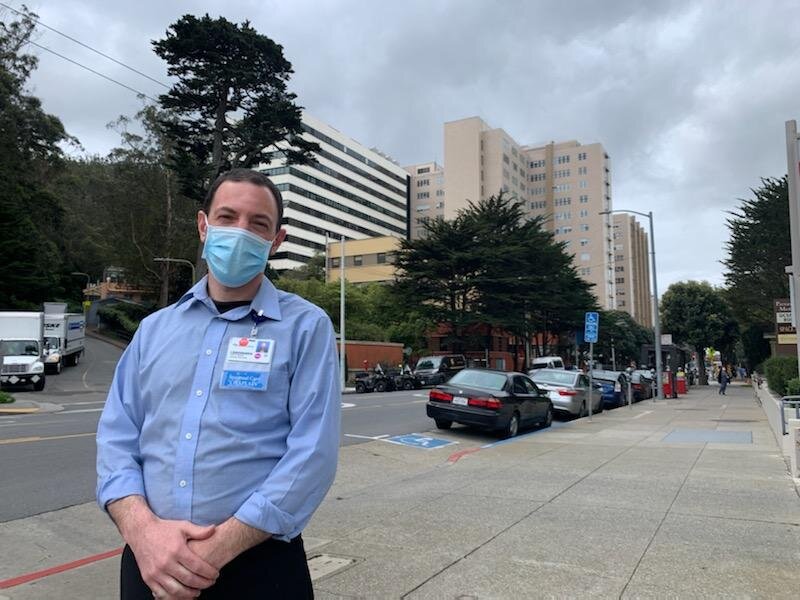In a pandemic, a Buddhist chaplain’s zen practice becomes purpose
Jamie Kimmel stands with San Francisco Medical Center in the background. Photo by Marissa Danney.
Jamie Kimmel was hired as a staff chaplain at the University of California, San Francisco Medical Center a week before the state declared a state of emergency on March 4. He’s assigned to the COVID-19 unit, where he was visiting patients in isolation until the hospital restricted chaplains from in-person contact.
“I can’t see people’s facial expressions,” Kimmel said. “I have to rely more on asking questions, and also discerning whether it’s the right time to ask a question or not.”
A hospital chaplain’s primary role is to be a calm presence for patients. The bedside is a place to reflect on what’s important. It’s a place for intimacy and existential questions.
Kimmel, 39, approaches his work from Zen Buddhism. The pressure and uncertainty of this moment — felt globally but hyper-concentrated in hospitals — suits his dharmology, a term for Buddhist theology. A central tenet is not turning away..
“It’s a huge thing that liberation happens now, in the moment, by providing what I would call the appropriate response,” he said. “So I see the work in front of me, I see that it’s much bigger than I am and I also see my place within it — that this is what I can do. That other people’s sense of ease and ability to connect is related to my own, and that we’re not separate.”
Kimmel’s training and prior experience as a volunteer at another hospital and a hospice chaplain couldn’t have prepared him for certain elements of this crisis. He’s rationing personal protective equipment and navigating public transportation as trains and bus lines are eliminated or reduced. He’s using the phone for some of the most urgent aspects of his work. Being separated from loved ones is huge, he said. The crisis has made that a reality for patients throughout the facility.
He copes with the rapid changing of the norm and the collective anxiety that permeates his environment by moving slower. He monitors his own emotional state, as chaplains are trained to do, which gives him the space for a wider array of choices in how he interacts with people, he said. His daily meditation practice has become more valuable. He talks to Kuan Yin, the Buddhist goddess of compassion, whose name means “to hear the cries of the world.”
Kimmel’s self-care also involves staying connected with the people in his life. Working in a hospital puts him at high risk of contracting the virus. That presents an ethical dilemma to caregivers whose responsibility to their patients makes them a significant risk factor to people outside their workspace, especially those they’re closest to. That could keep Kimmel separated from friends who are immunocompromised well after social distancing guidelines are relaxed.
Among patients, fear and fatigue is common. Their relatives are scared and feeling helpless. Chaplains are the link, voices on the phone facilitating what connection is possible, checking in on needs and often listening to raw frustration.
COVID-19 patients’ fear is compounded by anxiety about the possibility of having passed the virus to loved ones. For people of faiths with strong religious traditions, their desire for access to sacred rituals is urgent.
Kimmel’s Buddhism comes up only if someone asks about it. Most conversations are what they are whenever someone is waylaid by an unexpected malady.
“It wasn’t supposed to be like this,” they’ll say. “I’m not ready to go yet. I have a lot of other things I wanted to do.”
Chaplains aren’t there to fix things. Kimmel listens and affirms. He tries to pinpoint the emotion being expressed. When he’s effective, he sees a sense of relief in the person. They’ve said things they needed to say.
Kimmel said he is inspired daily by the dedication of the medical staff he works alongside. They share his work, attentive to their patients’ humanity as well as their physiology. He can’t share theirs, but his expertise can help stabilize the spirit.
To be effective in that, he has to see the world as it is, he said. It requires discipline rather than optimism or platitudes. His discipline is facing the reality we all share so that he can be fully present in it. The alternative is isolation, each person in their own world.
“That’s one thing about COVID,” Kimmel said. “If we didn’t think it before, we should think it now: we’re certainly all connected.”
Micah Danney is a Poynter-Koch fellow and a reporter and associate editor for Religion Unplugged. He is an alumnus of the Craig Newmark Graduate School of Journalism at CUNY and has reported for news outlets in the NYC area, interned at The Times of Israel and covered religion in Israel for The GroundTruth Project.

